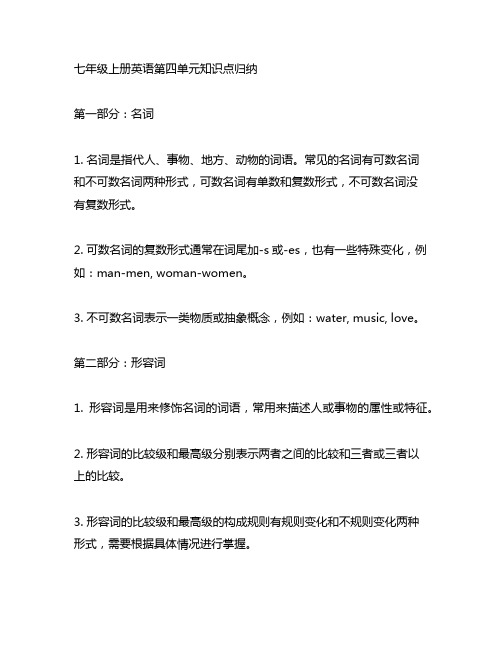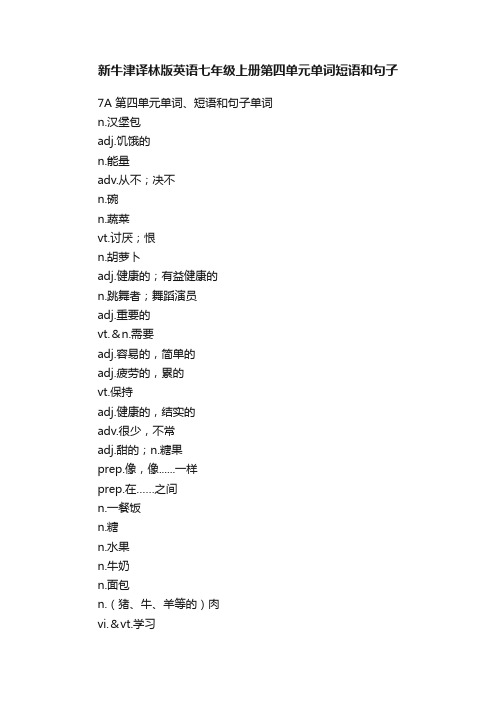译林版七年级英语上册第四单元知识点总结
七年级上册英语第四单元知识点归纳

七年级上册英语第四单元知识点归纳第一部分:名词1. 名词是指代人、事物、地方、动物的词语。
常见的名词有可数名词和不可数名词两种形式,可数名词有单数和复数形式,不可数名词没有复数形式。
2. 可数名词的复数形式通常在词尾加-s或-es,也有一些特殊变化,例如:man-men, woman-women。
3. 不可数名词表示一类物质或抽象概念,例如:water, music, love。
第二部分:形容词1. 形容词是用来修饰名词的词语,常用来描述人或事物的属性或特征。
2. 形容词的比较级和最高级分别表示两者之间的比较和三者或三者以上的比较。
3. 形容词的比较级和最高级的构成规则有规则变化和不规则变化两种形式,需要根据具体情况进行掌握。
第三部分:动词1. 动词是表示动作或状态的词语,包括行为动词和系动词两种形式。
2. 行为动词表示具体的动作或行为,例如:run, jump, study。
3. 系动词用来连接主语和表语,表示状态或性质,例如:be, seem, be。
第四部分:句型1. 英语句子的基本结构通常是主语+谓语+宾语的形式,也可以根据需要添加状语等修饰成分。
2. 英语句型可以按照功能和结构进行分类,例如陈述句、疑问句、祈使句等。
3. 在表达句子时需要注意时态、语态和语气等方面的要求,以确保表达准确。
总结回顾通过对七年级上册英语第四单元的知识点进行全面梳理和归纳,我们对名词、形容词、动词和句型等方面都有了更深入的理解。
名词的单数复数形式、形容词的比较级最高级、动词的行为和状态等都是我们学习和掌握的重点内容。
在学习过程中,我们需要多加练习,加深对这些知识点的理解和运用,从而提高英语表达能力。
个人观点和理解对于七年级上册英语第四单元的知识点,我个人觉得形容词的比较级和最高级是比较有意思的部分。
在比较两者或多者之间的差异时,可以使用这些形容词来进行描述,更加生动有趣。
名词的单数复数形式也是需要细心对待的地方,一些不规则的变化需要多加记忆和练习。
七年级上册英语译林版U4知识点

七年级上册英语译林版U4知识点英语译林版七年级上册U4知识点英语译林版七年级上册U4是学习英语语法的重要单元,本单元主要涉及代词、数词、冠词以及一些常用的形容词和副词等知识点,下面将逐一介绍。
一、代词1.人称代词人称代词分为主格和宾格两种形式。
主格代词可以作主语、表语和同位语,而宾格代词则可以作宾语、间宾和宾补。
例如:主格代词:I, you, he, she, it, we, they宾格代词:me, you, him, her, it, us, them2.物主代词物主代词表示所属关系,分为形容词性和名词性。
形容词性物主代词作定语;名词性物主代词则作主语、宾语或表语等。
例如:形容词性物主代词:my, your, his, her, its, our, their名词性物主代词:mine, yours, his, hers, its, ours, theirs3.反身代词反身代词表示动作的发出者或受事者与动作的承受者是同一人。
常见的反身代词有:myself, yourself, himself, herself, itself, ourselves, yourselves, themselves。
例如:I can wash myself.She hurt herself while playing basketball.二、数词数词指代特定的数字或数字序列,分为基数词和序数词两种形式。
基数词表示数量,如one, two, three等;序数词表示顺序,如first, second, third等。
例如:基数词:I have three pencils.序数词:I came in first in the race.三、冠词冠词分为不定冠词和定冠词两种。
不定冠词表示泛指,定冠词表示特指。
例如:不定冠词:I saw a bird in the tree.定冠词:The bird in the tree is very colorful.四、形容词和副词形容词和副词用来修饰名词和动词等,形容词主要表达名词的性质和特征,副词则表示动作的模式、时间、地点和程度等。
Unit4知识点 牛津译林版英语七年级上册

7AU4知识点New words and expressions:1.wake up.He wakes up at six o’clock.1.He wakes her up at seven o’clock.2/Shall we go fishing this afternoon?OK/Good idea! That’s all right. (No,let’s go shopping.3.He seldom goes out.He’s never late for school.4.She has breakfast/lunch/dinner.5.I need to go home early6.have a good rest7.have fun/have a good (great) time (in) doing sth.I have fun playing football8.have lessons/have an English lesson.9.after-school activities10.do one’s homeworkHe does his homework/We do our homework.He doesn’t do his homework./Does he do his homework?11.go to bed. He goes to bed at 9/He gets up at six .12.be late for He is late for school/the meeting.13.The meeting/Our school starts at 8 o’clock.14.a quarter past six/seven half past eight15.at six in th emorning/afternoon16.play football first.17.chat with him/her chat with each other18.learn from each other/ help each other19wish best wishes wish you successWish your team good luck.20.would like to go shopping.Would you like to go shopping this afternoo ?21.save my life---save their lives.22.go to the museum.23twice a week/once a year. How often does he go home?24.go on a picnic=go on picnics25.dislike playing games27.get ready for th eparty/th emeeting.28.learn a lot about the worldLanguage points: 1.It’s time for breakfast=It’s time to have breakfast2.Shall we go running/walking in the hill?3.I seldom go out /play games.4.After sleep I sleep.5.nad a good rest/He needs some milk.6.I don’t know how to have fun/what to do /how to do it/where to go7.What time do you strat lessons?8enjoy myself/enjoy working in Beijing/living in Shanghai.9.talk about playing games.10.from Monday to Friday—five days a week.11.Our lessons begin at 8:15.12.My favourite subject is English/sport is swimming.13.a lot of friends—lots of /many14.They are all nice(kind) to us---All of them are nice to us.15.a Reading Club16.read books/borrow books from the library.17.I also like playing volleyball.18.I’m in the school volleyball team=I’m a member of the school team.19.on Wednesday afternoon20.in the evening/in March/in winter/in 2202/in 2012.321.on Saturday/on 1 July/on Sunday morning/on Children’s Dayon a cold morningo/ on the afternoon of September 122.at seven o’clock/at 6 years old/at Christmas23.Thanks for your e-mail/giving me a pen/helping us with our English.24.tell you about my life/tell us about your school.25.I’m good at playing football=I play footballwell.26.He often plays football in the playground.27.She doesn’t have lunch time to play tennisShe has atime to sing.28.She’s a member of th eswimming team.She usually swims after school.29.He never plays basketball.30.He goes to her dancing lessons.31.She always dances for half an hour.32.She sometimes goes roller skating.33.Saturday ,7 November.34.Welcome to our schol/our school football match.35.There’s a volleyball match between A and B.36.He goes there by bus.37.I hope everyone can come and watch the game.38Wish our team good luck.39.What do you like to do at weekends?40.How often do you visit the Great Wall.Twice a month41.Morning exercises are good fo rus.42.Reading in th esun is bad for your eyes.43.have too much homework to do.44.so I can’t play basketball well.45.It helps me get ready for the day.48.I don’t like singing.49.It’s fun/interesting.。
牛津译林版英语七年级上册分单元知识点归纳总结(Unit1-8))

牛津译林版英语七年级上册全册知识点归纳总结(最新)Unit one一、词汇知识点整理:look after \ take care of 照顾;表示look 的短语:look after照顾look at 看…;look for 寻找look like 看起来像…on the first day 在第一天Class One, Grade Seven (先说班级,再说年级,且大写)。
play football 踢足球after school 放学后be\come from 来自be good at \do well in 擅长fly kites 放风筝go home 回家listen to music 听音乐play a game 玩游戏wear glasses 戴眼镜at school 在学校all the lessons 所有的课程talk about 谈论over there 那里 a lot of hobbies 许多爱好二、结构用法:love\like doing sth 喜欢做某事let’s +动词原形让我们I am\My name is 我叫welcome to +地点欢迎来到This is 这是be good at \do well in doing 擅长做in Class…Grade…在几年级几班be from = come from + 地点, 意思是“来自某地”。
He is from Nanjing. P8 他来自南京。
live with…in…和谁住在哪里live with sb 和某人住一起;live in+ 城市名,住在某地;live on the ground floor 住在一楼(用介词on)I’m …year old. 我几岁了。
year(s) old ,……岁,如果数词大于1,year 要用复数years. 问年龄要用How old “几岁”提问。
例如:- is your sister? --- She is 11. 应填How old.I have (short/long)hair.我留着短(长)头发三、句式用法What’s your name?你叫什么名字?Nice to meet you! 很高兴见到你。
七年级上册英语知识点全第四单元unit知识点

t4重点词汇:where、table、bed、bookcase、sofa、chair、on、under、come、desk、tidy、always...1、重点短语:on the sofa 在沙发上 on the table 在桌上on your head 在你的头上 under the chair在椅子下under the bed 在床下 under the table 在桌下in your schoolbag 在你的书包里 in the bookcase 在书柜里in your grandparents’ room 在你爷爷奶奶的房间里come on 快点2、where引导的特殊疑问句;用于询问“某人或某物在哪里”;若谓语动词为be动词;其结构为“Where + be + 主语”;be动词要与后面的主语保持一致..其答语;用“主语+be+表示地点的的介词短语”为避免重复;句中的主语一般用代词代替..----Where is/are...----It’s/They’re on /in/under...----Where is my English book----It’s on the desk.1My clock is on the table就画线部分提问________ ________ your clock2你的爸爸在哪翻译下列句子______________________________________________3、on 在……的上面接触 on the sofa/desk/table/bed on thetree 在树上本身固有的in 在……的里面 in your schoolbag/room in the tree 在树上外来的事物under 在……的下面正下方 under your bed/desk若表示“某物在某地”则用“物 + be + 介词短语”结构..e.g. It’s under your bed.The teaching building has five floors. My classroom is _______the third floor.A.onB. atC. toD. onMy baseball is _______the floor; _______the table.A. on;underB. on;onC. under;underD.under;on5、辨析table和desk:6、含有介词短语的陈述句变一般疑问句步骤:1把be动词放在句首;2注意第一人称和第二人称的转换;3把句号改为问号;4用yes和no 来回答..e.g. The keys are on the sofa .-------Are the keys on the sofa将下列陈述句改为一般疑问句;The new pen is in my schoolbag._____________________________________His coat is on his bed._____________________________________________The books are on the table._________________________________________7、come on “快点;加油” e.g. Come on; it’s getting dark.1“来吧;行啦”用来表示请求、鼓励、劝说等;e.g. Come on; Kate. Don’t be shy.2“加油”;用于体育竞赛等场合鼓励队员;e.g. “Come on” shouted the Class One students.3“来;过来”;用于招呼别人e.g. Come on This way; please.__________;we’ll be late.A. ComeB. Come inC. Come onD. Go8、I don’t know.don’t = do notknow “认识;知道”为实意动词 ;其否定形式应借助于助动词do或does;再加not构成..除第三人称用doesn’t外;其他人称均用don’t.注意动词须用原形e.g. He doesn’t know.She ________know his name.填动词的正确形式9、tidy 1adj.“整洁的、整齐的”;常见短语:be tidy 整洁的;keep tidy保持整洁;a tidy +n.一个整洁的……e.g. The room is very tidy./He is a tidy boy.2v及物动词;“使整洁”;短语:tidy up sth.使某物整洁e.g. I must tidyupmy room.3v不及物动词;“收拾;整理”;短语:tidy up 收拾;整理e.g. Please tidy up after dinner.9、but 连词“但是;然而”;表转折关系;可以连接两个并列成分或分句;不能与though/although 同时出现在一个句子中..and 连词“和、同、与”;常用于表示并列关系或意义的递进;意为“而且”..e.g. I’m tidy;but Gina is not.He knows me and I know him.Tony is a quiet student; ________he is active in classA. soB. andC. butD.or10、everywhere adv. “到处、各个地方”;不能在其前使用in、at、to ;可做表语..========everyplacee.g. In spring ;we can see flowers everywhere. Dust is everywhere.作表语He follows me everywhere and it makes me feel so trapped.我觉得我被困住了We shouldn’t throw rubbish_______到处to protect the environment.11、always 频度副词;“总是”;1一般用于一般现在时中; 2通常放在助动词、be动词、情态动词之后;行为动词之前;注意:1always 后面的动词用一般现在时;主语是第三人称单数;动词应用三单形式;其他用原形;2对频度副词提问;用——how often3常见的频度副词还有:usually; often; sometimes; ever;never等..e.g. I always watch TV at night./She always likes to ask why.放在动词前In much of China;spring is always very short.放在be动词之后The trains are always on time.He can’t always do the same thing.用于情态动词后---Do you often go fishing with your father---Yes; _____.I like fishing very much.A.neverB. alwaysC. ever12、ask 1v.及物动词“问;询问”e.g. Don’t ask me---I don’t know.2v.不及物动词“问”e.g. If you don’t know; you must ask.相关短语:ask for 要求;请求 ask sb. for help 向某人寻求帮助ask sb.notto do sth. 要求某人不要做某事能力提升根据句意及首字母提示完成单词1.My schoolbag is u______ the table.2.I have a c____. It can tell me the time.3.He is a boy; b____ I’m a girl.4.Gina’s book is everywhere. She isn’t t_______.5 ---W______ are my CDs ---They are on the table.句型转换1.His key are on the table.对画线部分提问_______ _______ his keys2.I know his name.改为否定句I _______ _______ his name.3.They’re on the chair.改为单数形式的句子_______________________________________________4.It’s in the schoolbag.改为复数形式的句子______________________________________________ 5.This is my room.改为一般疑问句;并作出肯定回答----________this ________ room----________; _______ _______.。
译林版英语七年级上册第四单元复习

7A Unit Four Food1. hungry—hungrier—hungriest 反义词full2. health—healthy—healthily healthiermore healthily be good for healthkeep healthy grow healthily3. easy—easier—easiest easily—more easily4. tired more tired less tired feel tired5. keep(stay) fit / healthy 保持健康keep the hall clean 保持大厅的干净keep sb doing sth让某人不断做某事keep sb from doing sth让某人不做某事keep doing sth.不停地做某事keep chickens 饲养鸡6. like prep. 像v. 喜欢look like sound like Susan, like her mother, likes music.苏珊像她妈妈一样喜欢音乐。
7. between Mum and me between meals8. sweet n. 糖果adj. 甜的How sweet the sweets are!这些糖果多么甜!9. plan(v.)—planning—planned plan to do sth.(n.) the plan for sth.What’s your plan for your holiday?10. free—freely move freely自由地移动for free免费地 a free ticket一张免费的票in my free/spare time在我的闲暇里11. lie—lay—lain—lying 躺;位于lie in bedChina lies in the east / in the eastern part of the world.lie—lied—lied说谎lie谎言tell a lie12. luck—lucky—luckily luckier more luckilybe lucky enough to do sth 幸运地做某事good luck to sb. with sth.Good luck with your new diet and lifestyle.祝你新的饮食和生活方式好运。
新牛津译林版英语七年级上册第四单元单词短语和句子

新牛津译林版英语七年级上册第四单元单词短语和句子7A 第四单元单词、短语和句子单词n.汉堡包adj.饥饿的n.能量adv.从不;决不n.碗n.蔬菜vt.讨厌;恨n.胡萝卜adj.健康的;有益健康的n.跳舞者;舞蹈演员adj.重要的vt.&n.需要adj.容易的,简单的adj.疲劳的,累的vt.保持adj.健康的,结实的adv.很少,不常adj.甜的;n.糖果prep.像,像......一样prep.在……之间n.一餐饭n.糖n.水果n.牛奶n.面包n.(猪、牛、羊等的)肉vi.&vt.学习adj.拔尖的,头等的;n.顶,顶部n.篮球adv.&adj.快vt.&vi.改变;变化vi.计划,打算n.果汁,蔬菜汁n.健康n.人adj.小心的,仔细的n.水adj.圆的n.柠檬n.芒果n.西红柿n.牛肉n.猪肉n.卷心菜adj.自由的,空闲的在……前面n.故事n.土豆,马铃薯n.([复数]shelves)架子n.([复数]knives)刀;餐刀n.绵羊n.小包;(一)包n.盐n.茶n.千克,公斤vt.买n.祖父;外祖父n.瓶子n.面条少于n.饼干n.分数;点vi.躺、卧;说谎vi.觉得,感到1n.运气n.超级市场,超市vt.搬运,运输;携带n.花生n.汤prep.没有,不n.清单n.日常饮食n.零食n.可口可乐n.能量n.长沙发n.数量n.生活方式溜旱冰n.纸盒;牛奶盒;糖果盒int.哇,哇塞n.问卷n.祝贺n.搭档,合作伙伴adv.总体上说n.卡,拉里路(热量单位)n.维他命,维生素短语重点词组1. 想要成为一名舞蹈者_________________2. 变累______________________________3. 改变饮食___________________________4. 早饭吃一些面包____________________5. 一名顶尖学生_______________________6. 快餐______________________________7. 冰淇淋_____________________________8. 一点也不__________________________9. 吸收、摄取_________________________ 10.保持苗条_________________________11.每周两次_________________________ 12.计划做某事_________________________三、句型结构1. It’s important for a dancer to be healthy. (it 作为形式主语,用动词不定式作真正的主语)e.g. 1) 对于我们而言学好英语很必要。
译林版七年级英语上册第四单元知识点总结

译林版七年级英语上册第四单元知识点总结译林版七年级英语上册第四单元知识点总结一、单元主题及重要性本单元主题为“My day”,围绕学生的日常生活和学习经历展开,包括一系列的活动和时间管理。
通过学习本单元,学生能够更好地了解和掌握日常生活中的英语表达,提高英语听说读写能力,特别是对时间状语和相关话题的运用能力。
二、知识点梳理1、时间状语:本单元涉及多种时间状语,如“at eight o’clock”、“in the morning”、“after lunch”、“on weekends”等。
学生需要掌握这些时间状语的正确用法,并能在实际生活中运用。
2、日常活动描述:单元中学习了如何用英语描述日常活动,如“I usually start my day at 7 o’clock”、“I often do my homework in the evening”等。
学生需要掌握描述日常活动的句型和词汇。
3、话题讨论:本单元涉及的话题包括日常生活、学校学习、业余活动等。
学生需要掌握相关话题的讨论技巧和常用表达。
4、动词时态:通过学习本单元,学生进一步巩固和掌握了描述一般性动作的现在进行时态,如“I am having lunch”、“They are playingfootball”等。
三、重点难点解析1、时间的正确表达:学生需要掌握时间的正确表达方式,如“o’clock”、“past”、“to”等。
2、日常活动描述的准确性:学生需要准确描述自己的日常活动,避免混淆或误用词汇和短语。
3、话题讨论技巧:学生需要学会展开话题讨论,发表观点,提问和回答问题等技巧。
4、动词时态的运用:学生需要理解并掌握现在进行时态的用法,能在适当的时候正确运用。
四、学习建议1、注重口语练习:在日常学习中,学生应该多进行口语练习,包括朗读、对话、复述等,提高自己的口语表达能力。
2、写作训练:通过写日记、小作文等方式,学生可以锻炼自己的写作能力,巩固所学知识。
- 1、下载文档前请自行甄别文档内容的完整性,平台不提供额外的编辑、内容补充、找答案等附加服务。
- 2、"仅部分预览"的文档,不可在线预览部分如存在完整性等问题,可反馈申请退款(可完整预览的文档不适用该条件!)。
- 3、如文档侵犯您的权益,请联系客服反馈,我们会尽快为您处理(人工客服工作时间:9:00-18:30)。
七年级英语上册第四单元知识点总结一、词汇知识点整理:1.wake up 醒来wake sb up 叫醒某人2. go out 出去3. after breakfast/lunch/dinner 早餐/中餐/晚餐后4.have/eat breakfast/lunch/dinner 吃早餐/中餐/晚餐5.need a good rest 需要好好的休息6. need to do sth 需要做某事7.go walking 去散步8.in the hills 在山里9.how to 如何/怎样10. have fun 玩的愉快have fun doing sth愉快做某事11. do morning exercises 做早操12. have lessons 上课13. do after-school activities 做课外活动14. do homework 做作业do one’s homework 做某人的作业15.be late for … 迟到16. start lessons 开始上课17. at a quarter past eight 在8点15分18. at a quarter to eight 在7点45分19.at half past seven 在7点半句型:1. Shall we go walking in the hills? 让我们到山里散步好吗?Shall we + 动词原形…?让我们…好吗?2. ---When do you go to school every day? 你每天什么时候上学?--- I go to school at twenty past seven. 我7点20分上学。
3. --- What time do you start lessons? 你们几点开始上课?--- At a quarter to eight. 在7点45分。
时间的表达:1.顺读法:7:20 seven twenty 8:30 eight thirty 9:15 nine fifteen2.逆读法:当分钟>30时(60-分钟)to (小时+1)表示几点差几分如:7:40 twenty to eight 8:45 a quarter to nine当分钟≤30时分钟past 小时表示几点过几分如:9:10 ten past nine 7:30 half past seven 8:15 a quarter past eightReading短语:1.from Monday to Friday 从星期一到星期五2.be good at doing sth 擅长做某事3.a lot of= lots of + 可数名词/不可数名词许多many + 可数名词复数许多much+不可数名词许多4.be nice/kind/friendly to sb 对某人友好5.chat with sb 和某人聊天chat→cha tt ing6.each other 相互7.or 或者;否则8.in the playground 在操场9.my friends and I 我和我的朋友(注意I放在and后)10.on Tuesday 在星期二(星期前用on)11.in the school volleyball team 在学校排球队12.practise doing sth 练习做某事13.have a good time 玩得愉快14.Best wishes 美好的祝愿15.read books 看书句型:1.Our school starts at eight in the morning from Monday to Friday.我们的学校生活是从星期一到星期五早上8点开始。
2.Our lessons begin at 8:15. 我们8点15分开始上课。
3.They are all nice to me. 他们对我很好。
Grammar短语:1.Thanks for doing sth 谢谢…2.would like to do sth = want to do sth 想要做某事3.tell sb about sth 告诉某人某事4.play with 和…一起玩5.this year 今年6.have great fun 玩得很高兴7.have much time to do sth. 有很多时间做某事8.dancing lessons 舞蹈课9.for half an hour达半个小时10.how often 多久一次11.go roller skating 去滑旱冰句型:1.Thanks for you email. 谢谢你的电子邮件。
2.I would like to tell you about my life here. 我想告诉你我在这里的生活。
3.--- How often do they exercise? 他们多久锻炼一次。
--- He usually plays football in the playground.他经常在操场踢足球。
4.--- How often does she go to her dancing lessons. 她多久去上一次舞蹈课?--- She goes to her dancing lessons once/twice a week. 她一个星期去上舞蹈课一次/两次。
语法:时间介词的用法:1)在月份,季节,年份前及早上、下午、晚上前用介词in如:in January/February/March … 在一月/二月/三月…in spring/summer/autumn/winter 在春天/夏天/秋天/冬天in 2017 在2017年in the morning/afternoon/evening 在早上/下午/晚上2)在星期、日期、具体的某一天、具体某一天的早上、下午、晚上及节日前用on如:on Sunday/Monday/Tuesday/Wednesday/Thursday/Friday/Saturday在星期日/ 星期一/ 星期二/ 星期三/ 星期四/ 星期五/ 星期六on March 12 在3月12日on the morning of December 6th 在12月6日早上on this/that day 在这/那一天on Children’s Day 在儿童节on Teachers’ Day 在教师节3)在点钟及年龄前用at如:at nine o’clock 在9点at 7:20 在7点20 at half past eight 在8点半at a quarter to eight 在7:45 at 6 years old 在6岁at 7 months old 在7个月频率副词:一般用来表示动作发生的频率。
常常放在行为动词前,be动词或助动词(do/does)后。
never( 从不0%) seldom( 很少20% ) sometimes( 有时40% ) often( 经常60% ) usually( 通常80% )always( 总是100% ) once(一次)twice( 两次)如:I always/usually/often/sometimes/seldom/never get up at 6 o’clock.我总是/ 通常/ 经常/ 有时/ 很少/ 从不在6点钟起床。
He is never late for class. 他上课从不迟到。
Integrated skills & task短语:1. at weekends 在周末2. visit a museum 参观博物馆3. once/twice a month 一个月一次/两次4.go on a picnic 去野餐5. what about doing sht = how about doing sth 做某事怎样?6. be good for … 对…有好处7.help sb(to)do sth 帮助某人做某事help sb with sth 帮助某人某事8. learn a lot about … 学会很多关于…的知识9. too much + 不可数名词太多… much too + 形容词太too many + 可数名词复数太多10. get ready for sth. 为某事/物作准备句型:1. ---- What do you like to do at weekends? 周末你喜欢做什么?---- I like to visit the museums. 我喜欢去参观博物馆。
2. ---- How often do you visit a museum? 你多久去博物馆一次?---- I visit a museum twice a month. 我一个月参观博物馆两次。
3. Wish our team good luck.!祝我们队好运!语法小练习:用所给词的适当形式填空The__________(five)day of a week is Thursday.We all like__________(play)computer gamesHe usually__________(go)to school at8:00We don’t have classes on S_________or SundayThe____________(twelve)month of a year is December.We have sports___________(two)a week.Bob___________(not do)his homework at weekends.What’s__________(you)name?__________(I)first name is Tom。
